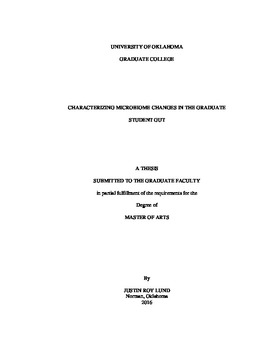| dc.description.abstract | Dysbiosis of the human microbiome is linked to human health problems, and as such, is a main concern of anthropological microbiome research. Analysis of how microbiomes change over time and under stress may reveal trends that lead to dysbiotic states. For this particular study, graduate students are of interest because they often relocate to distant places to study in their field of expertise. For any human, we can expect that travel and a new regional diet may influence the microbiome. For new graduate students, the added stress of school could also have a considerable influence. The purpose of this study is to determine if the combined effects of diet, travel, and stress are detectable in the oral and gut microbiomes of first year graduate students at the University of Oklahoma. Eleven participants, males and females, between the ages of 1825 self-collected fecal and saliva samples and were surveyed about life style behaviors. The V4 hypervariable region of the bacterial 16S rRNA gene was amplified by polymerase chain reaction (PCR) and deep sequenced using Next-Generation sequencing (NGS) to characterize the taxonomic profiles of the gut and oral microbiomes. Though the results were not statistically significant, the study participants show an increase over time in alphadiversity of the gut microbiome and only minimal change in the oral microbiome. The 16S rRNA sequence data show that the microbiomes of graduate students did experience change during their first semester at school, but the pattern of change is complex and generally not consistent across individuals. Most significantly, Ruminococcaceae is enriched in the winter samples. This study continues to characterize the adaptive nature of the human microbiome; future work would benefit from a larger participant cohort. | en_US |
